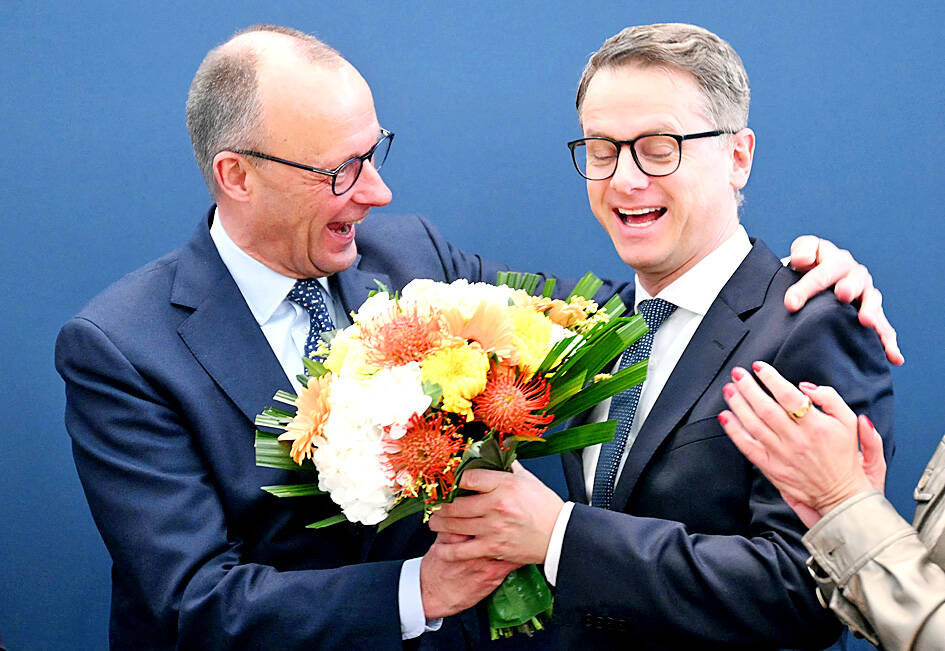Germany’s conservative election winner Friedrich Merz yesterday vowed to get to work on the arduous task of building a new coalition government, warning “the world is not waiting for us.”
Merz has warned against more paralysis in Berlin at a time when US President Donald Trump is driving head-spinning change, the German economy is in recession and society split after a polarizing election campaign.
Speaking late on Sunday, his victory dampened by a far-right surge, Merz said a united Europe must build up its own defenses as he had “no illusions at all about what is coming out of America.”

Photo: AFP
With more than 28 percent of the vote, his Christian Democratic Union of Germany and Christian Social Union in Bavaria bloc handily defeated German Chancellor Olaf Scholz’s Social Democrats (SPD) and the Greens, as the anti-immigration Alternative for Germany celebrated a record of more than 20 percent.
Following a heated campaign — dominated by the flashpoint issue of immigration after a spate of deadly attacks blamed on migrants — Merz now has to reach out to his former campaign-trail SPD foes. The conservatives will first enter talks without Scholz, who apologized for a “bitter” defeat at 16 percent, while his popular defense minister, Boris Pistorius, was expected to play a more central role.
In a TV debate late on Sunday, Merz said that he had been right to fight a “very tough election campaign” in which, on the eve of the vote, he had fumed about undefined “left-wing crazies.”
“But now we will talk to each other,” Merz said, striking a far more conciliatory tone. “We have to form a stable government as quickly as possible, with a good, stable majority.”
Merz must seek to establish communications with Trump, who has unsettled Ukraine and its European backers by reaching out to Russian President Vladimir Putin.
At the same time he must enter a process of horse-trading on party policies and red lines to hammer out a platform for a governing alliance.
“These are difficult starting conditions for a new German government, which is facing Herculean tasks in domestic and foreign policy,” said Cornelia Woll of the Hertie School Berlin. “One might hope that Germany will nevertheless be able to act quickly, so that it does not just have to watch how Trump and Putin shape the future.”
In an early positive response, Trump congratulated the conservatives on their win, describing it as “a great day for Germany, and for the United States.”
“The people of Germany got tired of the no common sense agenda, especially on energy and immigration,” said Trump, whose surrogates have hounded Scholz’s outgoing administration.
French President Emmanuel Macron said that he looked forward to working with Merz for a “strong and sovereign Europe.”
“In this period of uncertainty, we are united to face the great challenges of the world and of our continent,” he wrote on social media.
Ukrainian President Volodymyr Zelenskiy also congratulated Merz, saying he looked forward to working with Germany to “strengthen Europe.”

Taiwan is gearing up to celebrate the New Year at events across the country, headlined by the annual countdown and Taipei 101 fireworks display at midnight. Many of the events are to be livesteamed online. See below for lineups and links: Taipei Taipei’s New Year’s Party 2026 is to begin at 7pm and run until 1am, with the theme “Sailing to the Future.” South Korean girl group KARA is headlining the concert at Taipei City Hall Plaza, with additional performances by Amber An (安心亞), Nick Chou (周湯豪), hip-hop trio Nine One One (玖壹壹), Bii (畢書盡), girl group Genblue (幻藍小熊) and more. The festivities are to

Auckland rang in 2026 with a downtown fireworks display launched from New Zealand’s tallest structure, Sky Tower, making it the first major city to greet the new year at a celebration dampened by rain, while crowds in Taipei braved the elements to watch Taipei 101’s display. South Pacific countries are the first to bid farewell to 2025. Clocks struck midnight in Auckland, with a population of 1.7 million, 18 hours before the famous ball was to drop in New York’s Times Square. The five-minute display involved 3,500 fireworks launched from the 240m Sky Tower. Smaller community events were canceled across New Zealand’s

‘IRRESPONSIBLE’: Beijing’s constant disruption of the ‘status quo’ in the Taiwan Strait has damaged peace, stability and security in the Indo-Pacific region, MOFA said The Presidential Office yesterday condemned China’s launch of another military drill around Taiwan, saying such actions are a “unilateral provocation” that destabilizes regional peace and stability. China should immediately stop the irresponsible and provocative actions, Presidential Office spokeswoman Karen Kuo (郭雅慧) said, after the Chinese People’s Liberation Army (PLA) yesterday announced the start of a new round of joint exercises around Taiwan by the army, navy and air force, which it said were approaching “from different directions.” Code-named “Justice Mission 2025,” the exercises would be conducted in the Taiwan Strait and in areas north, southwest, southeast and east of Taiwan

UNDER WAY: The contract for advanced sensor systems would be fulfilled in Florida, and is expected to be completed by June 2031, the Pentagon said Lockheed Martin has been given a contract involving foreign military sales to Taiwan to meet what Washington calls “an urgent operational need” of Taiwan’s air force, the Pentagon said on Wednesday. The contract has a ceiling value of US$328.5 million, with US$157.3 million in foreign military sales funds obligated at the time of award, the Pentagon said in a statement. “This contract provides for the procurement and delivery of 55 Infrared Search and Track Legion Enhanced Sensor Pods, processors, pod containers and processor containers required to meet the urgent operational need of the Taiwan air force,” it said. The contract’s work would be